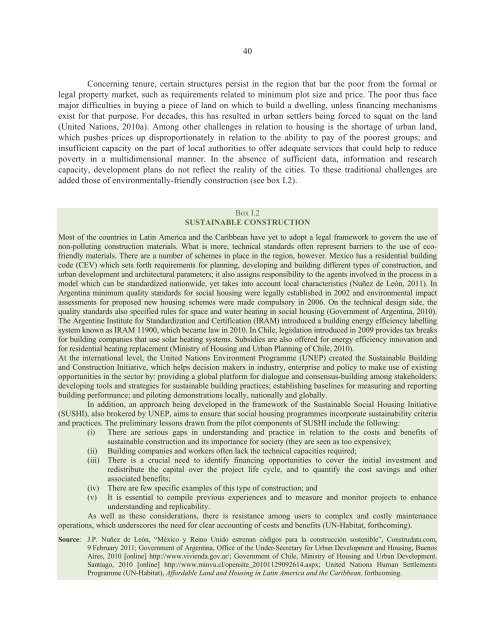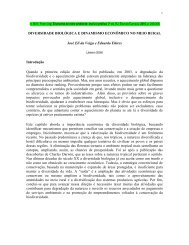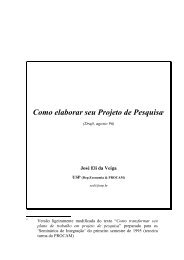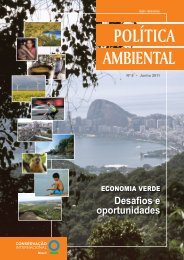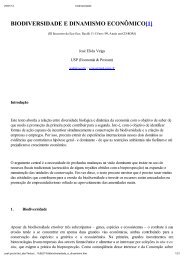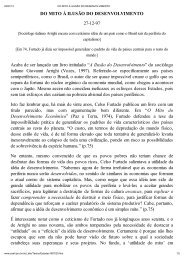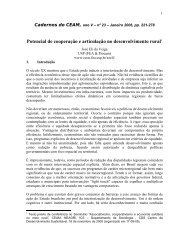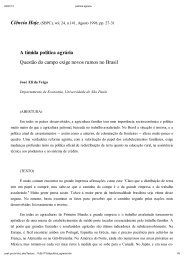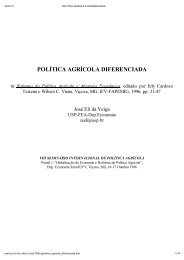sustainable development 20 years on from the ... - José Eli da Veiga
sustainable development 20 years on from the ... - José Eli da Veiga
sustainable development 20 years on from the ... - José Eli da Veiga
Create successful ePaper yourself
Turn your PDF publications into a flip-book with our unique Google optimized e-Paper software.
40<br />
C<strong>on</strong>cerning tenure, certain structures persist in <strong>the</strong> regi<strong>on</strong> that bar <strong>the</strong> poor <strong>from</strong> <strong>the</strong> formal or<br />
legal property market, such as requirements related to minimum plot size and price. The poor thus face<br />
major difficulties in buying a piece of land <strong>on</strong> which to build a dwelling, unless financing mechanisms<br />
exist for that purpose. For decades, this has resulted in urban settlers being forced to squat <strong>on</strong> <strong>the</strong> land<br />
(United Nati<strong>on</strong>s, <str<strong>on</strong>g>20</str<strong>on</strong>g>10a). Am<strong>on</strong>g o<strong>the</strong>r challenges in relati<strong>on</strong> to housing is <strong>the</strong> shortage of urban land,<br />
which pushes prices up disproporti<strong>on</strong>ately in relati<strong>on</strong> to <strong>the</strong> ability to pay of <strong>the</strong> poorest groups; and<br />
insufficient capacity <strong>on</strong> <strong>the</strong> part of local authorities to offer adequate services that could help to reduce<br />
poverty in a multidimensi<strong>on</strong>al manner. In <strong>the</strong> absence of sufficient <strong>da</strong>ta, informati<strong>on</strong> and research<br />
capacity, <str<strong>on</strong>g>development</str<strong>on</strong>g> plans do not reflect <strong>the</strong> reality of <strong>the</strong> cities. To <strong>the</strong>se traditi<strong>on</strong>al challenges are<br />
added those of envir<strong>on</strong>mentally-friendly c<strong>on</strong>structi<strong>on</strong> (see box I.2).<br />
Box I.2<br />
SUSTAINABLE CONSTRUCTION<br />
Most of <strong>the</strong> countries in Latin America and <strong>the</strong> Caribbean have yet to adopt a legal framework to govern <strong>the</strong> use of<br />
n<strong>on</strong>-polluting c<strong>on</strong>structi<strong>on</strong> materials. What is more, technical stan<strong>da</strong>rds often represent barriers to <strong>the</strong> use of ecofriendly<br />
materials. There are a number of schemes in place in <strong>the</strong> regi<strong>on</strong>, however. Mexico has a residential building<br />
code (CEV) which sets forth requirements for planning, developing and building different types of c<strong>on</strong>structi<strong>on</strong>, and<br />
urban <str<strong>on</strong>g>development</str<strong>on</strong>g> and architectural parameters; it also assigns resp<strong>on</strong>sibility to <strong>the</strong> agents involved in <strong>the</strong> process in a<br />
model which can be stan<strong>da</strong>rdized nati<strong>on</strong>wide, yet takes into account local characteristics (Nuñez de León, <str<strong>on</strong>g>20</str<strong>on</strong>g>11). In<br />
Argentina minimum quality stan<strong>da</strong>rds for social housing were legally established in <str<strong>on</strong>g>20</str<strong>on</strong>g>02 and envir<strong>on</strong>mental impact<br />
assessments for proposed new housing schemes were made compulsory in <str<strong>on</strong>g>20</str<strong>on</strong>g>06. On <strong>the</strong> technical design side, <strong>the</strong><br />
quality stan<strong>da</strong>rds also specified rules for space and water heating in social housing (Government of Argentina, <str<strong>on</strong>g>20</str<strong>on</strong>g>10).<br />
The Argentine Institute for Stan<strong>da</strong>rdizati<strong>on</strong> and Certificati<strong>on</strong> (IRAM) introduced a building energy efficiency labelling<br />
system known as IRAM 11900, which became law in <str<strong>on</strong>g>20</str<strong>on</strong>g>10. In Chile, legislati<strong>on</strong> introduced in <str<strong>on</strong>g>20</str<strong>on</strong>g>09 provides tax breaks<br />
for building companies that use solar heating systems. Subsidies are also offered for energy efficiency innovati<strong>on</strong> and<br />
for residential heating replacement (Ministry of Housing and Urban Planning of Chile, <str<strong>on</strong>g>20</str<strong>on</strong>g>10).<br />
At <strong>the</strong> internati<strong>on</strong>al level, <strong>the</strong> United Nati<strong>on</strong>s Envir<strong>on</strong>ment Programme (UNEP) created <strong>the</strong> Sustainable Building<br />
and C<strong>on</strong>structi<strong>on</strong> Initiative, which helps decisi<strong>on</strong> makers in industry, enterprise and policy to make use of existing<br />
opportunities in <strong>the</strong> sector by: providing a global platform for dialogue and c<strong>on</strong>sensus-building am<strong>on</strong>g stakeholders;<br />
developing tools and strategies for <str<strong>on</strong>g>sustainable</str<strong>on</strong>g> building practices; establishing baselines for measuring and reporting<br />
building performance; and piloting dem<strong>on</strong>strati<strong>on</strong>s locally, nati<strong>on</strong>ally and globally.<br />
In additi<strong>on</strong>, an approach being developed in <strong>the</strong> framework of <strong>the</strong> Sustainable Social Housing Initiative<br />
(SUSHI), also brokered by UNEP, aims to ensure that social housing programmes incorporate sustainability criteria<br />
and practices. The preliminary less<strong>on</strong>s drawn <strong>from</strong> <strong>the</strong> pilot comp<strong>on</strong>ents of SUSHI include <strong>the</strong> following:<br />
(i) There are serious gaps in understanding and practice in relati<strong>on</strong> to <strong>the</strong> costs and benefits of<br />
<str<strong>on</strong>g>sustainable</str<strong>on</strong>g> c<strong>on</strong>structi<strong>on</strong> and its importance for society (<strong>the</strong>y are seen as too expensive);<br />
(ii) Building companies and workers often lack <strong>the</strong> technical capacities required;<br />
(iii) There is a crucial need to identify financing opportunities to cover <strong>the</strong> initial investment and<br />
redistribute <strong>the</strong> capital over <strong>the</strong> project life cycle, and to quantify <strong>the</strong> cost savings and o<strong>the</strong>r<br />
associated benefits;<br />
(iv)<br />
(v)<br />
There are few specific examples of this type of c<strong>on</strong>structi<strong>on</strong>; and<br />
It is essential to compile previous experiences and to measure and m<strong>on</strong>itor projects to enhance<br />
understanding and replicability.<br />
As well as <strong>the</strong>se c<strong>on</strong>siderati<strong>on</strong>s, <strong>the</strong>re is resistance am<strong>on</strong>g users to complex and costly maintenance<br />
operati<strong>on</strong>s, which underscores <strong>the</strong> need for clear accounting of costs and benefits (UN-Habitat, forthcoming).<br />
Source: J.P. Nuñez de León, “México y Reino Unido estrenan códigos para la c<strong>on</strong>strucción sostenible”, C<strong>on</strong>stru<strong>da</strong>ta.com,<br />
9 February <str<strong>on</strong>g>20</str<strong>on</strong>g>11; Government of Argentina, Office of <strong>the</strong> Under-Secretary for Urban Development and Housing, Buenos<br />
Aires, <str<strong>on</strong>g>20</str<strong>on</strong>g>10 [<strong>on</strong>line] http://www.vivien<strong>da</strong>.gov.ar/; Government of Chile, Ministry of Housing and Urban Development.<br />
Santiago, <str<strong>on</strong>g>20</str<strong>on</strong>g>10 [<strong>on</strong>line] http://www.minvu.cl/opensite_<str<strong>on</strong>g>20</str<strong>on</strong>g>101129092614.aspx; United Nati<strong>on</strong>s Human Settlements<br />
Programme (UN-Habitat), Affor<strong>da</strong>ble Land and Housing in Latin America and <strong>the</strong> Caribbean, forthcoming.


